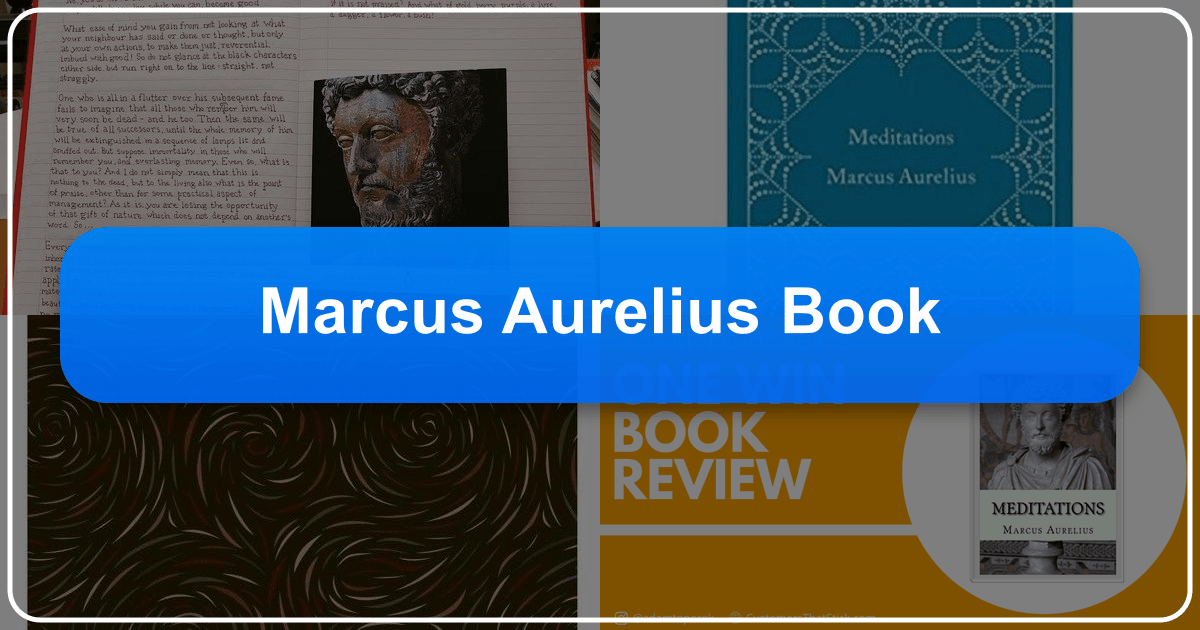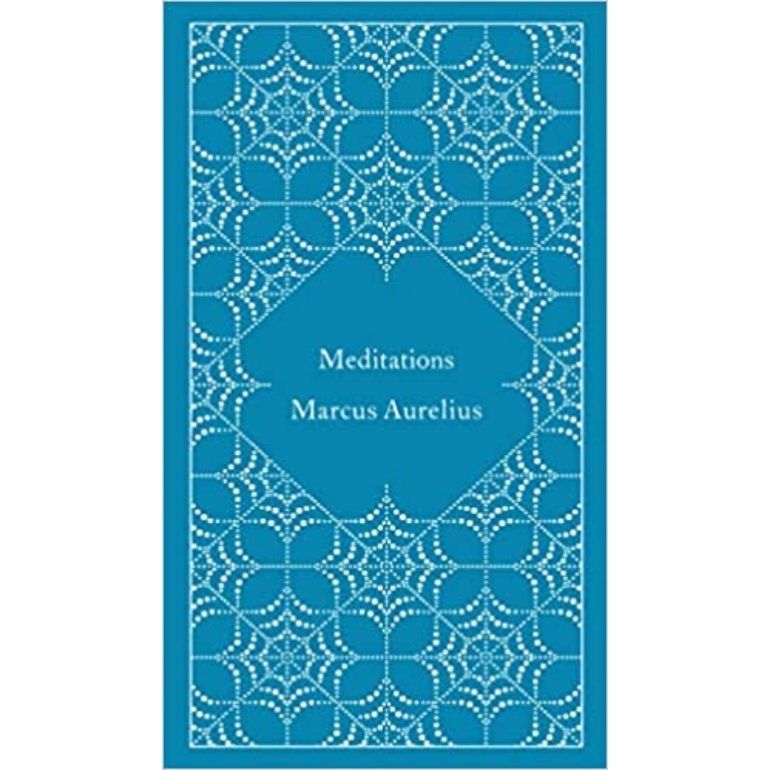Meditations by Marcus Aurelius: A Comprehensive Exploration

The enduring appeal of Marcus Aurelius’ Meditations transcends time and cultural boundaries. This personal journal, composed by a Roman emperor and Stoic philosopher, offers profound insights into self-improvement, ethics, and the nature of the universe. Its timeless wisdom continues to resonate with readers, shaping perspectives on leadership, resilience, and the pursuit of a meaningful life. This article delves into the various facets of Meditations, exploring its literary merit, historical context, and enduring cultural impact, utilizing a framework that encompasses books, authors, reading habits, libraries, and the broader cultural sphere.

The Book: Meditations—A Philosophical Classic
Meditations, unlike many philosophical treatises, was never intended for publication. Its intimate nature, revealing Aurelius’ personal struggles and reflections, is a significant aspect of its appeal. The text is not a systematic exposition of Stoic philosophy but rather a series of personal notes and reflections, offering a candid glimpse into the emperor’s inner world. This intimate quality fosters a sense of connection with the author, allowing readers to grapple with his ethical dilemmas and witness his attempts at self-improvement.
The book is structured into twelve books, each containing a collection of self-reflective entries varying in length and topic. These entries often grapple with themes central to Stoicism, such as virtue, reason, acceptance, and the transient nature of external goods. Aurelius constantly reminds himself of the importance of living virtuously, accepting what is beyond his control, and focusing on his internal state. This self-dialogue provides a powerful model for readers seeking self-improvement and emotional regulation.
Different editions of Meditations offer varying translations and accompanying materials, impacting the reader experience. Some editions provide extensive notes and commentaries clarifying historical contexts and philosophical concepts, enhancing understanding for both novice and seasoned readers. Other editions prioritize a more direct translation, aiming to preserve the original voice of Aurelius as closely as possible. The choice of edition depends on individual preferences and reading goals. While some readers prefer the richness provided by scholarly editions, others might find a straightforward translation more engaging and accessible.

The genre of Meditations is often classified as philosophy, specifically Stoicism. However, its intimate and personal tone also lends itself to classifications such as self-help and spiritual guidance. It’s a testament to the book’s multifaceted nature that it can appeal to readers seeking both intellectual stimulation and practical advice for navigating life’s challenges. The book’s enduring popularity is evidence of its adaptability to diverse readerships and purposes. Its accessibility as a collection of aphorisms and reflections makes it a book that can be read in short bursts or in longer stretches, suiting diverse reading styles.

Marcus Aurelius: Emperor, Philosopher, and Author
Marcus Aurelius (121-180 AD) was a Roman emperor who reigned from 161 to 180 AD. His legacy extends far beyond his political achievements; he is renowned for his profound contributions to Stoic philosophy. Unlike many philosophers who dedicated their lives to writing and teaching, Aurelius actively governed a vast empire while simultaneously engaging deeply in philosophical reflection. This unique background gave Meditations its distinctive perspective, blending practical considerations of leadership and governance with deeply personal philosophical exploration.
Aurelius’ education played a crucial role in shaping his philosophical outlook. He received comprehensive training in rhetoric, literature, and philosophy, influenced by prominent Stoic thinkers like Epictetus. This background provided him with a robust intellectual framework for his self-reflection and personal development. He did not merely passively absorb Stoic teachings; he actively engaged with them, adapting and integrating them into his personal worldview and daily life. The process of self-examination and ethical reflection is evident throughout Meditations.
His writing style in Meditations is characterized by its simplicity and directness. He eschews elaborate prose, favoring concise, aphoristic pronouncements that convey profound truths. The style reflects Aurelius’ focus on practical application of his philosophy; it prioritizes clarity and memorability above literary embellishment. This accessibility is arguably a key element of the book’s success, contributing to its ongoing popularity among diverse audiences. This contrasts with some other philosophical writings that often require significant intellectual effort and background knowledge for meaningful engagement.
The inspirations behind Meditations are multifaceted. His personal experiences, including the trials and tribulations of imperial rule, significantly informed his reflections. His daily struggles, military campaigns, and the loss of loved ones became opportunities for introspection and the development of resilience. His engagement with the philosophical works of earlier Stoic thinkers, particularly Epictetus, provided a theoretical framework for understanding these experiences. Thus, Meditations is not simply a philosophical treatise but a deeply personal testament to his life journey, illustrating the application of philosophical principles to real-world circumstances. This integration of personal experiences and abstract philosophical concepts is a unique feature that greatly contributes to the book’s continuing relevance and impact.
Famous Works
While Meditations is Aurelius’ most well-known work, it’s essential to acknowledge that it was not intended for public consumption. It was a personal journal, not a formal philosophical treatise, providing a unique, intimate perspective on Stoic philosophy. His life and reign also constitute a significant historical record, although it is his personal reflections that have resonated most powerfully across centuries.
Reading and Learning from Meditations
Meditations offers a rich resource for personal growth and self-understanding. Its aphoristic style allows readers to engage with the text in bite-sized portions, making it suitable for both short, focused reflection and extended engagement. Many readers use Meditations as a source of daily inspiration and guidance, applying Aurelius’ principles to their contemporary challenges. The practice of self-reflection, central to Stoicism and the essence of the book, can be directly adopted by readers through journaling or mindful contemplation.
The educational value of Meditations is significant. It provides a concise introduction to Stoic philosophy, illustrating its core tenets and implications for daily life. Readers gain a better understanding of Stoic concepts, such as virtue ethics, emotional regulation, and the acceptance of what is beyond their control. Beyond its philosophical content, Meditations models valuable approaches to self-reflection and personal growth. By witnessing Aurelius’ own internal struggles, readers learn the importance of honest self-assessment and the pursuit of continuous improvement. This approach is relevant far beyond the specific context of Stoicism, applicable to various areas of personal development and self-understanding.
Meditations offers numerous life lessons. It encourages readers to focus on what they can control—their actions, judgments, and reactions—while accepting the external world as it is. The importance of virtue, reason, and inner peace are recurring themes, providing a framework for developing resilience and navigating life’s challenges. Its core message is not about escaping suffering but finding strength and tranquility in the face of adversity. This message can serve as a valuable guide for managing stress, improving relationships, and pursuing personal goals.
Developing effective reading habits when engaging with Meditations is crucial for maximizing its benefits. Because of the aphoristic style, readers may find it advantageous to read short segments and reflect upon them before proceeding. Active reading, involving note-taking and journaling reflections on Aurelius’ insights, fosters deeper engagement and aids in personalizing the application of Stoic principles. Repeated readings, spanning days, weeks, or even years, can reveal new layers of meaning as readers’ experiences and perspectives evolve. The book’s ability to provide fresh insights on repeated readings enhances its educational value and strengthens its position as a resource for long-term personal development.
Meditations in Libraries and Archives
Meditations holds a significant place in libraries and archives worldwide. Its enduring popularity ensures its presence in numerous public and academic libraries, providing access to a wide range of editions and translations. Digital libraries further expand access to the text, offering online versions and searchable databases. Rare book collections and archives often hold significant historical editions, offering researchers valuable insights into the book’s evolution and reception throughout history.
The preservation of these various editions is crucial for preserving not only the text but also the historical context of its various interpretations and translations. Scholarly research relies heavily on access to these diverse resources, which allow for comparisons between translations and the study of textual variations. These libraries and archives provide the foundational resources for continuing scholarly explorations into Aurelius’ philosophy and the historical impact of his work.
The Cultural Impact of Meditations
Meditations’s cultural impact is profound and multifaceted. Its influence on philosophy is undeniable, shaping subsequent thought in Stoicism and related ethical systems. The book has served as a source of inspiration for numerous writers, artists, and thinkers, including prominent figures in history and contemporary society. Its central themes—self-control, virtue, and the acceptance of adversity—continue to resonate in self-help literature, providing readers with practical strategies for navigating life’s challenges.
Adaptations of Meditations exist in various forms. Scholarly commentaries and analyses provide detailed interpretations of its philosophical ideas. Creative works, such as fiction and film, draw inspiration from Aurelius’ life and philosophy, translating its core themes into accessible narratives. These adaptations are testament to the enduring relevance of Meditations, allowing its message to reach wider audiences through various creative expressions.
Meditations has received numerous accolades, though not in the form of traditional literary awards. Its enduring popularity and lasting influence across centuries stand as a testament to its lasting impact. The book’s continuous relevance and integration into contemporary discussions of philosophy, ethics, and self-improvement are further evidence of its significance.
Communities dedicated to Stoicism often use Meditations as a foundational text. Reading groups and online forums provide spaces for discussion and shared exploration of Aurelius’ philosophy, creating a platform for collective engagement and the personal application of Stoic principles. The enduring popularity and widespread accessibility of Meditations enable the flourishing of these supportive communities, fostering a global network of individuals who seek self-improvement through the lens of Stoic wisdom. These communities exemplify the book’s broader cultural impact, transforming its philosophical insights into a social force for personal growth and shared learning.
In conclusion, Meditations by Marcus Aurelius is more than just a philosophical text; it’s a multifaceted resource with lasting cultural significance. Its intimate reflections, timeless wisdom, and accessibility make it an enduring classic, inspiring generations to seek self-improvement, resilience, and a more meaningful existence. From its presence in libraries and archives to its influence on literature, film, and contemporary self-help movements, Meditations continues to shape individual lives and cultural conversations.